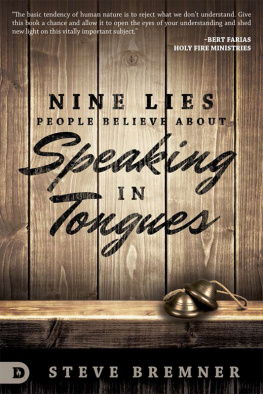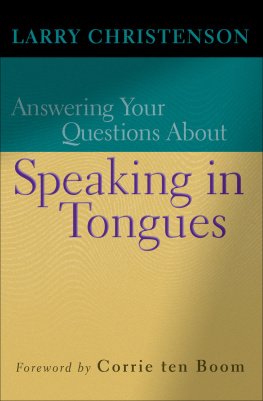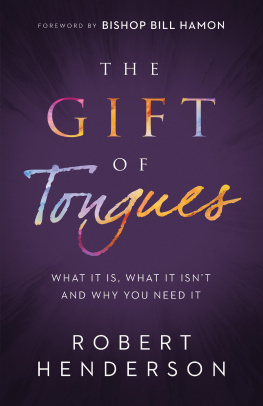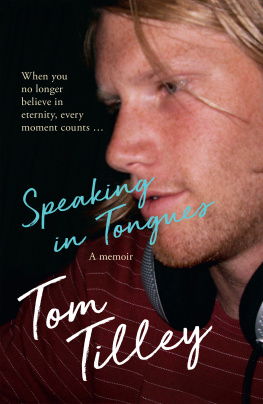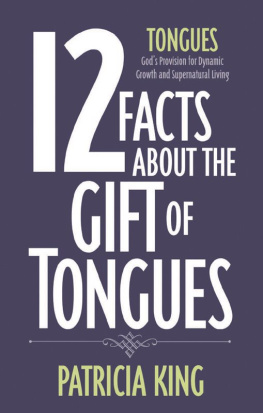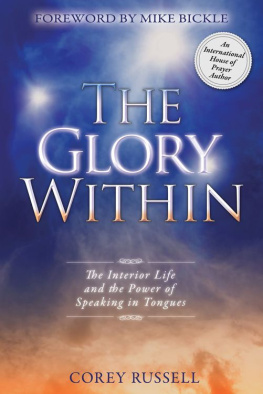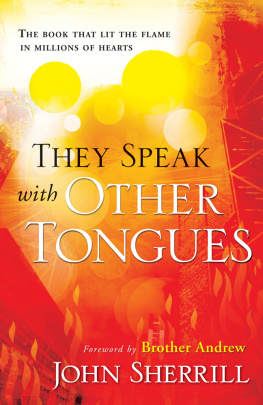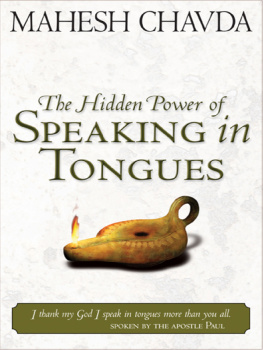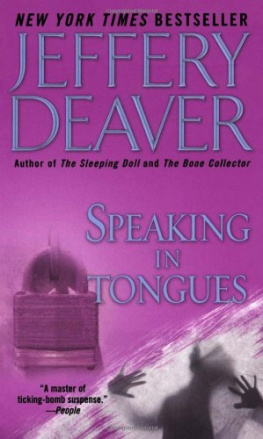ROUTLEDGE LIBRARY EDITIONS: SOCIOLOGY OF RELIGION
Volume 19
VOICES FROM THE GODS
VOICES FROM THE GODS
Speaking with Tongues
DAVID CHRISTIE-MURRAY
First published in 1978 by Routledge & Kegan Paul Ltd
This edition first published in 2019
by Routledge
2 Park Square, Milton Park, Abingdon, Oxon OX14 4RN
and by Routledge
52 Vanderbilt Avenue, New York, NY 10017
Routledge is an imprint of the Taylor & Francis Group, an informa business
1978 David Christie-Murray
All rights reserved. No part of this book may be reprinted or reproduced or utilised in any form or by any electronic, mechanical, or other means, now known or hereafter invented, including photocopying and recording, or in any information storage or retrieval system, without permission in writing from the publishers.
Trademark notice: Product or corporate names may be trademarks or registered trademarks, and are used only for identification and explanation without intent to infringe.
British Library Cataloguing in Publication Data
A catalogue record for this book is available from the British Library
ISBN: 978-0-367-02386-7 (Set)
ISBN: 978-0-429-02545-7 (Set) (ebk)
ISBN: 978-0-367-07417-3 (Volume 19) (hbk)
ISBN: 978-0-367-07419-7 (Volume 19) (pbk)
ISBN: 978-0-429-02063-6 (Volume 19) (ebk)
Publishers Note
The publisher has gone to great lengths to ensure the quality of this reprint but points out that some imperfections in the original copies may be apparent.
Disclaimer
The publisher has made every effort to trace copyright holders and would welcome correspondence from those they have been unable to trace.
VOICES from the GODS
Speaking with Tongues
David Christie-Murray
First published in 1978
by Routledge & Kegan Paul Ltd
39 Store Street,
London WC1E 7DD and
Broadway House,
Newtown Road,
Henley-on-Thames,
Oxon RG9 1EN
Photoset in 11 on 13 Garamondby
Kelly and Wright, Bradford-on-Avon, Wiltshire
and printed in Great Britain by
Redwood Bum Ltd
Trowbridge and Esher
Plates printed by
Headley Brothers Ltd, Ashford, Kent
David Christie-Murray 1978
No part of this book may be reproduced in
any form without permission from the
publisher, except for the quotation of brief
passages in criticism
British Library Cataloguing in Publication Data
Christie-Murray, David
Voices from the gods.
1. Glossolalia
I. Title
291.42 BL 54 78-40620
ISBN 0 7100 8810 8
My interest in speaking with tongues began when, some forty years ago, I heard an almost illiterate charwoman at a Pentecostalist meeting pour out a paean of fluent and ecstatic praise in what seemed a foreign language. Since then I have learned that glossolalia (paranormal speaking in tongues) and xenolalia (paranormal speaking in allegedly recognizable foreign languages) are features of many other sub-cultures, besides Pentecostalist Christian. Pentecostalism alone has grown so rapidly in the present century that something like one in every four or five hundred of the worlds present inhabitants has spoken in Christian tongues at some time in his life; and if all the cultures which exhibit glossolalia, including Spiritualism, are included in the reckoning, the proportion is appreciably higher. It is true that in the latter cases tongues are more limited than with Pentecostalists; for whereas every Christian in many Pentecostalist denominations is expected to speak in tongues at least once, as a sign of his baptism with the Holy Spirit, the gift in the other cultures is limited to individuals, shamans and mediums.
The bibliography of glossolalia is far more extensive than might be expected. The books and articles deal, however, with limited aspects of the subject - Christian, anthropological, Spiritiualistic, linguistic or psychological - and there has been no survey which tries to give an introduction to the whole subject and discover the relationship, if any, between tongues spoken by different cultures. Psychological explanations, moreover, which seemed final in the 1920s have been overtaken by recent developments. Tongues are not necessarily motor- automata exhibited by illiterates worked up into pathological mental states by revivalist campaigns. They are practised by educated, intelligent worshippers in quietness and without emotionalism and are taken seriously by many in the older-established Churches.
Nor is there any reason why there should not be varieties of glossolalia. Psychologists and theologians are apt to assume that outbreaks of motor-automata and charismata are always to be ascribed to approximately similar conditions. But each case must be taken on its merits and the evidence, after being studied as objectively as possible, allowed to speak for itself.
Changes in the law and in the atmosphere of thought mean that phenomena once suspect can be studied objectively in the open. There is also widespread contemporary interest in the occult and anything connected with it, both on a popular level and among serious scholars trying to add an understanding of psychical phenomena to the body of human knowledge. It is hoped that this book may have something of interest for both these, as well as for the ordinary reader who is perhaps only slightly affected by the contemporary interest in strange phenomena. AU these types of reader may like to have a general introduction in all its ramifications, and a one-volume alternative to the collecting of a not-inconsiderable library.
Any author owes a debt to more people than he can possibly name. My own obligation is not only to the many hundreds of books and articles written on speaking in tongues by theologians and Spiritualists but to many individuals who, hearing of my interest, communicated spontaneously with me. I am particularly indebted to the headquarters staff of the Society for Psychical Research, to Mr Nigel Buckmaster, a member of the Society, who, after a chance meeting in its Library, supplied me with a bibliography which otherwise might have taken me many months to collect, and to Dr W. J. Samarin, Professor of Linguistics at the University of Toronto who, unasked, sent me copies of some of his important articles on glossolalia containing the findings of linguistic scholarship. In naming these benefactors I acknowledge equally many others, recorded where possible in the Notes or in the Bibliography.
The author and publishers are grateful for permission to quote from the following works:
Morton Kelsey, Tongue Speaking


